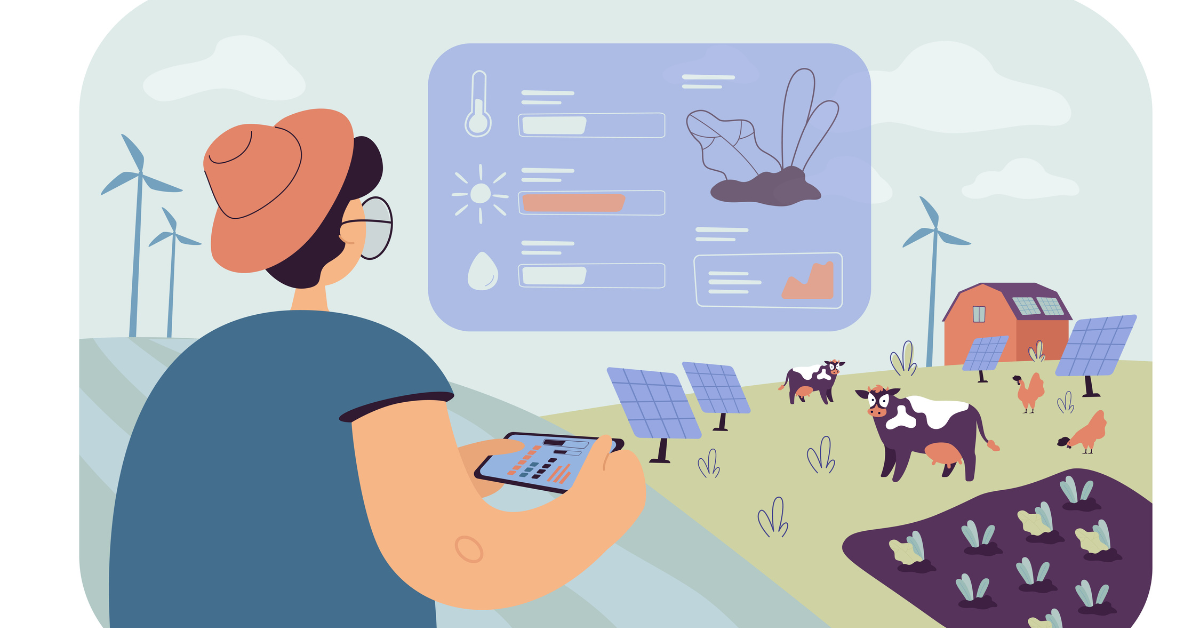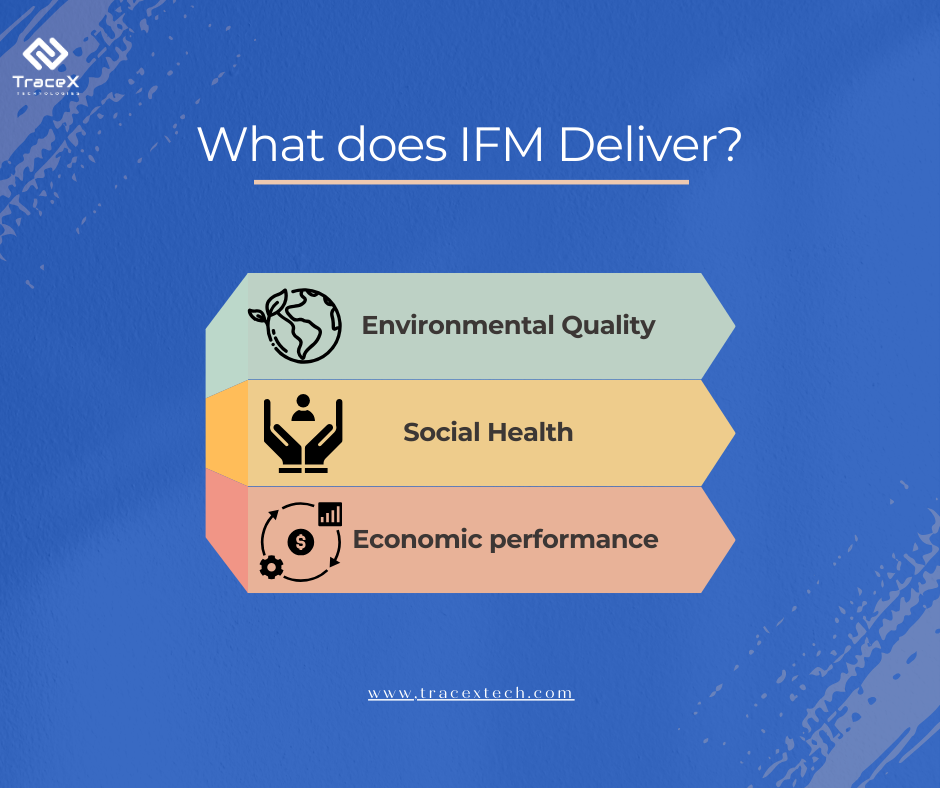Contact: +91 99725 24322 |
Menu
Menu
Quick summary: Explore the 9 key principles of Integrated Farm Management Systems in our latest blog. Learn how these principles guide sustainable and efficient farming practices, covering aspects like precision agriculture, environmental stewardship, and supply chain transparency. Dive into the core of modern farming strategies for a more holistic and productive agricultural approach.

In the realm of modern agriculture, the integration of technology has ushered in a new era of efficiency and sustainability. Integrated Farm Management Systems (IFMS) stand at the forefront of this agricultural revolution, offering a holistic approach that combines cutting-edge technology with traditional farming practices. From precision farming and resource optimization to data-driven decision-making, IFMS encompasses a suite of tools designed to streamline operations and enhance overall farm performance.
An Integrated Farming System (IFS) is a sustainable and holistic approach to agriculture that involves the integration of various crops, livestock, and other agricultural activities to maximize resource utilization, minimize environmental impact, and increase productivity and profitability.
This blog delves into the transformative potential of Integrated Farm Management Systems, exploring how they redefine agricultural practices and pave the way for a more sustainable and technologically advanced future.
Integrated Farm Management Systems (IFMS) refer to holistic approaches combining various agricultural practices to optimize productivity and sustainability. IFMS integrates crop and livestock management, resource conservation, and environmental considerations, fostering a synergistic approach to farming.
Streamlining farming processes through technology is crucial for modern agriculture. Technology enhances efficiency by automating tasks, monitoring crop health, and optimizing resource use. Precision agriculture, IoT applications, and data analytics enable farmers to make informed decisions, minimizing waste and maximizing yields. This integration not only boosts productivity but also promotes sustainability, ensuring responsible use of resources. Embracing technology in farming is imperative for meeting global food demands while minimizing environmental impact.
Integrated Farm Management (IFM) embodies a comprehensive farm business approach, striving to achieve sustainable farming practices. By seamlessly blending modern technology with traditional methods, IFM aims to foster prosperous farming that not only benefits the environment but also actively engages local communities. LEAF(Linking Environment and Farming), as a proponent of IFM, actively develops and advocates for this holistic approach, providing a range of services to support farmers in implementing resilient and sustainable practices on their farms.
IFM is composed of: Organization and Planning, Soil Management and Fertility, Crop Health and Protection, Pollution Control and By-Product Management, Animal Husbandry, Energy Efficiency, water Management, Landscape and Nature Conservation and Community Engagement.
A thriving Integrated Farm Management (IFM) approach relies on effective organization and meticulous planning. Establishing objectives and consistently monitoring outcomes serve as the metrics for quantifying, showcasing, and perpetually refining the benefits of IFM. The utilization of management plans and reviews significantly influences the financial viability of the farm. Factors such as staff motivation, family involvement, crop and livestock performance, environmental dedication, and community engagement are crucial considerations. Informed organization and planning encompass record-keeping, staff training, market development, and communication, ensuring the seamless and efficient operation of the farm. Moreover, this approach reduces business risks and enhances resilience to change. While these considerations may seem evident, having well-defined and documented procedures not only prevents errors but also lays the groundwork for contingency plans, constituting the fundamental principles of IFM.
Agricultural production hinges on the foundation of soil. Preserving and enhancing this invaluable resource must be a top priority on every farm. The presence of fertile soil and available land is indispensable for cultivating robust crops and livestock. High-quality soil not only supports effective water management but also mitigates the risk of nutrient runoff, serves as a carbon sink, and fosters biodiversity. Responsible soil stewardship entails regular analysis, maintenance, and enhancement of physical, chemical, and biological soil health. This proactive approach ensures sustained soil fertility, promotes organic matter buildup, and reduces the likelihood of erosion, structural degradation, compaction, and related environmental issues such as flooding and drought. By engaging in sound soil husbandry practices, farms not only increase yields but also bolster profitability.
Safeguarding crops against weeds, pests, and diseases is a standard practice in farming to uphold yields and minimize preventable losses. While crop protection is vital, it is crucial to ensure that the control methods employed are both safe and effective, thereby reducing the risk of water pollution and contributing to the preservation of biodiversity and abundance of native species. Integrated Pest Management (IPM), within the framework of Integrated Farm Management (IFM), adopts a comprehensive approach to crop health and protection. This involves the integration of cultural, biological, thermal, mechanical, and, when necessary, chemical strategies to safeguard crops. Striking a balance between optimizing yield and quality, maintaining crop health, achieving cost efficiency, and ensuring environmental protection is imperative, necessitating a consideration of a diverse range of approaches.
Virtually every agricultural process generates ‘by-products’ or ‘wastes,’ posing potential pollution risks and environmental threats. The prudent approach involves minimizing these risks through the principles of reduce, reuse, and recycle. Well-executed pollution control and by-product management constitute integral components of Integrated Farm Management (IFM). This strategic management not only maximizes resource utilization, prevents pollution, and saves costs but also plays a pivotal role in safeguarding water, energy, biodiversity, and soil health. Recognizing that many farm ‘wastes’ hold intrinsic value, this section emphasizes their optimal utilization for cost savings and reduced pollution risks.
Ensuring optimal animal welfare, maintaining the health status of herds or flocks, and implementing effective feeding practices are indispensable elements of any livestock enterprise. Prudent animal management not only contributes to enhanced grass production but also reduces costs associated with sward restoration. Thoughtful livestock management plays a pivotal role in minimizing topsoil and nutrient losses, improving watercourse quality, and promoting biodiversity. With careful planning and management, manures and slurries emerge as valuable resources, serving as crucial fertiliser inputs and significantly cutting down production costs. Animal health, being a key determinant of successful livestock operations, profoundly impacts production outcomes.
Understanding sustainability concerns and adopting responsible practices for natural resource management are pivotal aspects of Integrated Farm Management (IFM). A judicious approach to energy usage on the farm not only yields cost savings but also enhances resource efficiency and minimizes waste. Additionally, it plays a crucial role in reducing overall greenhouse gas emissions from agricultural activities. Mindful utilization of inputs, adopting suitable tillage practices, minimizing dependence on fossil fuels, and prioritizing optimum yields over maximum yields collectively enhance energy efficiency. These efforts contribute significantly to long-term returns while aligning with sustainable and responsible farming practices.
Environmental stewardship lies at the heart of Integrated Farm Management (IFM) and should be seamlessly woven into all facets of the IFM framework. For many farmers, the tangible expression of this stewardship is a living farm landscape, enriching the public’s connection with the countryside. Responsible landscape management not only fosters enhanced biodiversity but also safeguards soil and water resources, improves land value, enhances the farm’s image, and opens new market opportunities. Additionally, environmental land management supports a spectrum of ecosystem services that benefit both the farm and its surrounding areas.
Strategic water management stands as a fundamental element in Integrated Farm Management (IFM). The prudent management of water resources, coupled with assessing and enhancing on-farm water efficiency, not only results in cost savings but also ensures provision for future needs. Implementing sound water management practices plays a crucial role in safeguarding water sources, enhancing water quality, and promoting sustainability. Specifically, it contributes to the reduction of run-off and pollution, improves field access and soil workability, and facilitates the restoration of wetland areas. Sustainable water management in agriculture is imperative for amplifying agricultural production while upholding the environmental benefits and social requirements of water systems.
Establishing robust community connections holds numerous benefits. Through these networks, farmers can effectively communicate their farming practices, including the principles of Integrated Farm Management (IFM). A positive relationship with the local community serves as a storefront for the business, with all aspects of IFM contributing to what is shared and showcased. This process builds trust not only in individual businesses but also in farming as an industry. Maintaining strong connections with the local community and diverse individuals addresses concerns about the countryside and fosters a deeper connection between people and their food.

The integration of precision agriculture technologies involves incorporating tools like GPS-guided machinery, sensors, and drones to enhance farming accuracy. These technologies enable farmers to precisely manage tasks such as planting, irrigation, and harvesting, optimizing resource use and reducing environmental impact.
Data analytics plays a pivotal role in optimizing farming practices by processing vast amounts of information generated on the farm. Analyzing data related to soil health, weather patterns, and crop performance allows farmers to make data-driven decisions. Insights gained from analytics help in tailoring irrigation schedules, adjusting fertilizer application, and predicting disease outbreaks. By harnessing the power of data, farmers can enhance efficiency, minimize input wastage, and improve overall yields, contributing to sustainable and economically viable agriculture. The synergy between precision agriculture technologies and data analytics fosters a smarter and more resilient farming ecosystem.
Farm management software helps farmers collect, organize, and analyze data related to various aspects of their operations. It may include modules for crop management, inventory tracking, financial planning, and data visualization. Enables centralized management of farm activities and facilitates informed decision-making.
Remote sensing technologies, including satellite imagery, offer a bird’s eye view of the entire farm. Satellite imagery for crop health monitoring, disease detection, and yield prediction. Enhances crop management, allows for early identification of issues, and supports precision agriculture.
Blockchain provides a decentralized and secure ledger for transparent and traceable record-keeping. Traceability of agricultural products builds supply chain transparency, and data integrity.
TraceX farm management and traceability solutions play a vital role in supporting Integrated Farm Management (IFM) by providing tools and features that enhance efficiency, traceability, and decision-making across various aspects of farming.
The solutions enable farmers to centralize and manage data related to crop management, livestock, and environmental conditions in a single platform. The traceability features, allowing farmers to track the journey of agricultural products from the farm to the market. Accurate inventory management ensures optimal resource utilization, reduces waste, and supports sustainable farming practices. TraceX solutions may support farmers in complying with industry standards and certifications related to sustainability and organic farming. TraceX enhances supply chain visibility by providing real-time information on the movement of agricultural products. The solutions offer mobile applications, allowing farmers to access critical information on the go. The analytics and reporting features offer insights into key performance indicators and trends.
In conclusion, integrated farm management systems represent a transformative approach to agriculture, blending technology, sustainability, and data-driven decision-making. By incorporating precision agriculture technologies, farmers can efficiently utilize resources, minimize waste, and optimize yields. Financial planning tools and robust accounting features contribute to the economic viability of farming operations.
The emphasis on sustainable farming practices within integrated systems not only ensures the long-term health of the land but also aligns with the growing global demand for environmentally conscious agriculture. Tools for monitoring and improving environmental impact, such as precision technologies and analytics, play a crucial role in achieving this delicate balance between productivity and conservation.
Looking ahead, emerging trends in integrated farm management systems, driven by AI, machine learning, and blockchain technology, promise even greater efficiencies and transparency. These innovations hold the potential to revolutionize decision-making processes, enhance predictive modeling, and establish trust in the agricultural supply chain.
As agriculture continues to evolve, the integration of advanced technologies and sustainable practices remains essential for addressing the challenges of food security, environmental stewardship, and economic sustainability. Integrated farm management systems serve as a blueprint for a more resilient, efficient, and responsible future in global agriculture.
